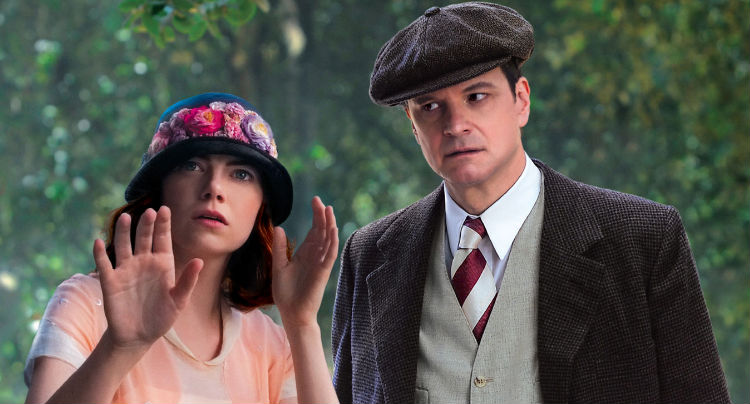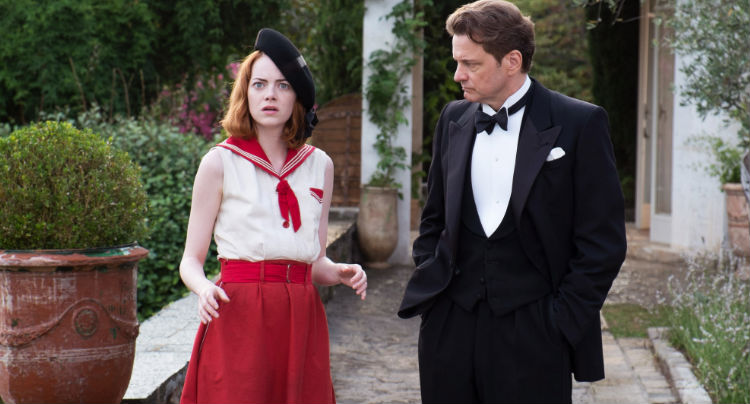
Blurring the line between period piece and pre-war fantasy, Magic in the Moonlight tugs at the heartstrings ever so gently.

Blurring the line between period piece and pre-war fantasy, Magic in the Moonlight tugs at the heartstrings ever so gently.
Woody Allen returns to his touristic tendencies in Magic in the Moonlight a film set in the gorgeous natural surroundings of the south of France circa 1928. This is a decidedly light and breezy outing for Mr. Allen, but one that has an enchanting air about it, pleasurable until the end. Those who delight in Allen’s witty banter will find a treasure trove of funny lines to recite for their friends, but a momentous work this is not; a lack of narrative finesse and tepid chemistry between its two stars stops the film short of the greatness of Midnight in Paris, Vicky Cristina Barcelona, and Match Point, his best films of the 21st century.
Driving the film is Stanley Crawford, a British, world-renowned illusionist played by a perfectly casted Colin Firth whose signature sternness serves the role well. Firth plays Stanley with a good measure of high-class English properness (he’s a natural at that kind of thing) mixed with a heavy dose of skepticism and boorishness that makes him a compelling and hilariously crude protagonist. Stanley’s tasked by a friend to debunk a ravishing American mentalist named Sophie (Emma Stone), who’s been dazzling rich folk along the French Riviera. Aside from being known to the world as Wei Ling Soo, the Chinese master magician (he wears a costume and make-up when he performs), Stanley also boasts an unblemished streak of disproving mystics, a streak he has every confidence will remain unbroken given a few days with Sophie at one of her wealthy victim’s sprawling estates.
On the surface, Magic is a sweetly entertaining cat-and-mouse romance full of laughs and stunning vistas, and this is where its pleasures would end in the hands of a less experienced filmmaker. Allen adds introspective depth to the film, however, as his cynicism and disillusionment with the world around him are embodied by Stanley, who’s constantly convinced that all good things are a hoax. (He is a professional hoaxer, after all.) But Allen reckons with this negative energy in the film by telling a story that knocks Stanley down a few pegs and convince him that there are, in fact, unexplainable delights in this world that we should bear no shame in indulging. Sophie, a ray of sunshine and spirituality, is Allen’s emphatic endeavor to make believers of non-believers.

While Sophie’s seances and impromptu “mental vibration” readings stupefy and astound everyone around her, Stanley’s gift for sniffing out phoniness makes him far less vulnerable to her mental miracles. He can’t stop himself from trying to poke holes in her would-be facade, but the more he prods, the more impenetrable her aura becomes. When Sophie, donning a fetching black beret and red skirt, reads Stanley’s “vibrations” and correctly senses that he once had an uncle who drowned, his jaw hits the floor just as everyone else’s. Could this blue-eyed girl really be the link to the great beyond?
Stanley does eventually let down his guard and stamp Sophie as a legitimate mystic (in a moment best discovered in the film), but his transition from skeptic to believer is handled clumsily. Despite several scenes in which Stanley’s disbelief is abated, the actual turn feels jarringly over-enthusiastic, to the point that you wonder whether or not he’s being facetious as he showers Sophie with praise and apologies for his bull-headedness.
Following Stanley’s epiphany, the film more outwardly takes the form of a Rohmer-ish destination romance. The pairing of Stone and Firth works incredibly well comedically, with the funniness of their barb battles magnified by the discrepancy in age and temperament. Romantically, however, the two don’t fit quite as snugly. When actors successfully sell their attraction to one another, you can almost feel the body heat between them, but here, Stone and Firth come just short of sparking a flame. Their body language isn’t forced, but it does feel a bit labored.
The supporting cast is typically excellent for an Allen production, with Eileen Atkins standing out as Stanley’s compassionate, wise aunt. Also making a mark is Hamish Linklater, playing an enthusiastic young man who follows Sophie around like a puppy, singing her romantic ’20s pop tunes on his ukelele (a sight ten times funnier on screen than it is on paper). The set and costume design is shimmery and glamorously detailed, with the fancy cars and mansions looking so stunning the film blurs the line between period piece and pre-war fantasy.
Magic in the Moonlight isn’t the funniest, best looking, or most enjoyable installment Allen’s oeuvre, but it’s perfectly recommendable and memorable. Like its characters, bathed in wondrous sunlight, the film charms with its words and entices with its good looks, strolling along, tugging at the heartstrings ever so gently.